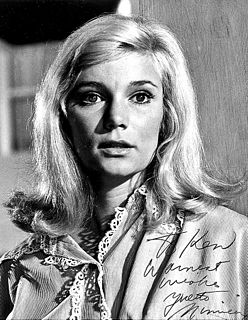A Quote by Michael Kimmelman
Everything, even the most ordinary daily affair, is enriched by the lessons that can be gleaned from art.
Related Quotes
Circumstances do not push or pull. They are daily lessons to be studied and gleaned for new knowledge and wisdom. Knowledge and wisdom that is applied will bring about a brighter tomorrow. A person who is depressed is spending too much time thinking about the way things are now and not enough time thinking about how he wants things to be.
The Christian religion, then, is not an affair of preaching, or prating, or ranting, but of taking care of the bodies as well as the souls of people; not an affair of belief and of faith and of professions, but an affair of doing good, and especially to those who are in want; not an affair of fire and brimstone, but an affair of bacon and bread, beer and a bed.
Behind all art is an element of desire...Love of life, of existence, love of another human being, love of human beings is in some way behind all art — even the most angry, even the darkest, even the most grief-stricken, and even the most embittered art has that element somewhere behind it. Because how could you be so despairing, so embittered, if you had not had something you loved that you lost?
For most couples who come to me - especially in the aftermath of the revelation of an affair, when they are in a state of crisis and fear the loss of a predictable future - they start to have conversations for the first time about love, sex, monogamy, and marriage. Most couples don't negotiate or don't even converse about any of these things until the crisis of the affair has actually forced them to. Why does it take infidelity to get us talking about the stuff that should be there from the start?
There are ancient and modern poems which breathe, in their entirety and in every detail, the divine breath of irony. In such poemsthere lives a real transcendental buffoonery. Their interior is permeated by the mood which surveys everything and rises infinitely above everything limited, even above the poet's own art, virtue, and genius; and their exterior form by the histrionic style of an ordinary good Italian buffo.
Love doesn't have to be perfect. Even perfect, it is still the best thing there is, for the simple reason that it is the most common and constant truth of all, of all life, all law and order, the very thing which holds everything together, which permits everything to move along in time and be its wonderful or ordinary self.
Me, I've seen 45 years and I've only figured out one thing. That's this: if a person would just make the effort, there's something to be learned from everything. From even the most ordinary, commonplace things, there's always something you can learn. I read somewhere that they said there's even different philosophies in razors. Fact is, if it weren't for that, nobody'd survive.



































